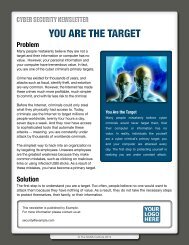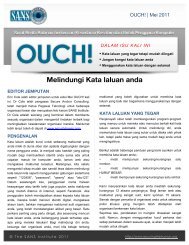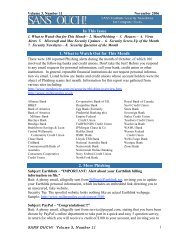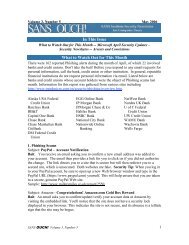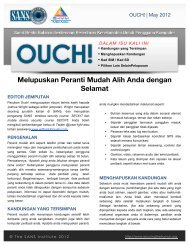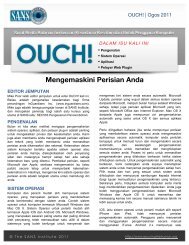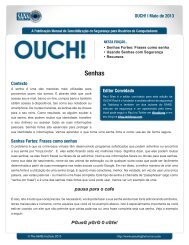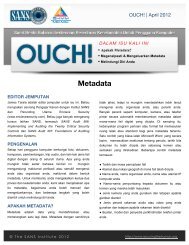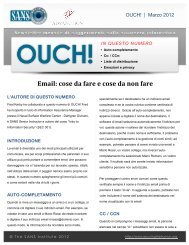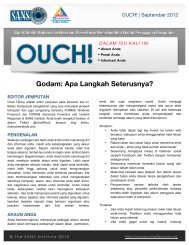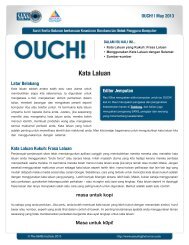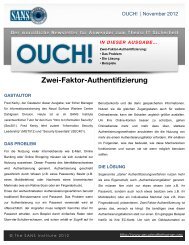SANS$Securing$Your$Kids$Handout$ - Securing the Human
SANS$Securing$Your$Kids$Handout$ - Securing the Human
SANS$Securing$Your$Kids$Handout$ - Securing the Human
Create successful ePaper yourself
Turn your PDF publications into a flip-book with our unique Google optimized e-Paper software.
<strong>SANS$<strong>Securing</strong>$Your$Kids$Handout$</strong><br />
The Internet is a powerful tool we want all of our children to learn how to use and leverage.<br />
However it also comes with certain risks. Below is an overview of <strong>the</strong>se risks and how to<br />
mitigate <strong>the</strong>m.<br />
Online Risks To Your Children<br />
Strangers / Criminals: These are individuals who establish online relationships with your children in order to<br />
take advantage of <strong>the</strong>m. Once <strong>the</strong>y gain <strong>the</strong> trust of a child, <strong>the</strong>y may ask for pictures, information or even to<br />
meet in person.<br />
Friends: These are people your children already know, and are often o<strong>the</strong>r kids at school. Friends can pose<br />
a serious threat as online bullies. Remember that bullying no longer means just physical confrontation. Cyber<br />
bullying can be far more abusive, as you may not know who <strong>the</strong> bully is and <strong>the</strong>ir attacks can be both more<br />
aggressive and very public.<br />
Themselves: In today’s world of social networking children can be <strong>the</strong>ir own worst enemy. Anything <strong>the</strong>y post<br />
is accessible not only to <strong>the</strong> entire world, but once posted may also be difficult or even impossible to remove.<br />
Your children may not realize how <strong>the</strong>se postings can impact <strong>the</strong>ir future.<br />
Five Steps To Protecting Them<br />
Education: Talk to your kids about risks of being online. Make sure <strong>the</strong>y feel comfortable talking to you about<br />
anything <strong>the</strong>y do not understand or are afraid of. Education is <strong>the</strong> best security measure you can take,<br />
technology is changing too fast for technology to solve you and your children’s problems.<br />
Dedicated Computer: Have a dedicated computer just for your kids and keep it in a public area. Ensure each<br />
child has <strong>the</strong>ir own, non-privileged account so you can track <strong>the</strong>ir activity. Consider a separate homework<br />
account for unlimited homework use.<br />
Mobile Devices: Put hours or limitations on when mobile devices can be used, and create a central family<br />
charging station where children put <strong>the</strong> mobile devices when not in use.<br />
Computer Rules: Have a set of agreed upon rules and post those rules next to <strong>the</strong> kids’ computer.<br />
Technology: When kids are younger you can use parental controls and o<strong>the</strong>r software to safeguard <strong>the</strong>ir<br />
activities; this is especially helpful in preventing <strong>the</strong>m from accidently visiting inappropriate websites. However<br />
as children grow older technology becomes less effective.<br />
Non-profit Dedicated to Protecting Kids<br />
OnGuard Online<br />
Microsoft Family Safety<br />
Facebook on Protecting Your Kids<br />
OpenDNS Service<br />
Parental Software Options<br />
http://preview.tinyurl.com/63ebnz3<br />
http://preview.tinyurl.com/6bm8xyu<br />
http://preview.tinyurl.com/3mqatb9<br />
http://preview.tinyurl.com/3tbda2a<br />
http://preview.tinyurl.com/3m37k3k<br />
http://preview.tinyurl.com/3m37k3k<br />
© The SANS Institute www.securing<strong>the</strong>human.org
Online$Rules$Example$<br />
Here is an example of some possible rules you can use with your kids. If <strong>the</strong>y are old<br />
enough, you can have <strong>the</strong>m help create <strong>the</strong> rules. Make sure <strong>the</strong>se rules are understood,<br />
agreed upon and posted. You may have to update <strong>the</strong>se rules as <strong>the</strong>y get older.<br />
1. Each child has <strong>the</strong>ir own, dedicated non-privileged account on <strong>the</strong> family computer. You<br />
may use this account for personal activities including gaming or talking with friends. There is<br />
a separate, shared account on <strong>the</strong> computer just for homework. You may use this account<br />
only for homework or any educational purposes, such as khanacademy.com or<br />
wikipedia.com. You may not use <strong>the</strong> homework account for gaming.<br />
2. Each child gets thirty minutes of personal computer use per day during weekdays and one<br />
hour personal computer use per day on weekends. Time on <strong>the</strong> homework account is<br />
unlimited, but is limited to educational activities only. Time and activities are enforced<br />
through parental controls.<br />
3. You may only use mobile devices during certain times of <strong>the</strong> day. Specifically, on weekdays<br />
you may use mobile devices for no more than 30 minutes between 3:30pm and 7:30pm, and<br />
on weekends no more than 60 minutes between 8:00am and 7:30pm. When you are not<br />
using mobile devices <strong>the</strong>y must be at <strong>the</strong> family charging station.<br />
4. Each child will be responsible for maintaining <strong>the</strong>ir own accounts, including remembering <strong>the</strong>ir<br />
own passwords.<br />
5. Each child promises to tell Mom or Dad if any strangers ask <strong>the</strong>m odd questions or keeps<br />
trying to talk to <strong>the</strong>m, if any friends are mean to <strong>the</strong>m, or if <strong>the</strong>y find any websites that are<br />
scary or <strong>the</strong>y do not understand. You will never get in trouble for letting Mom or Dad know<br />
you feel uncomfortable, asking questions or letting <strong>the</strong>m know you need help.<br />
6. When asked by a parent to leave <strong>the</strong> computer or mobile you have fifteen seconds to pause<br />
<strong>the</strong> computer or log off.<br />
7. Access to technology is a privilege, not a right. When you fail to follow <strong>the</strong>se rules,<br />
punishment can include being banned from using computers or mobile devices.<br />
!<br />
© The SANS Institute www.securing<strong>the</strong>human.org



